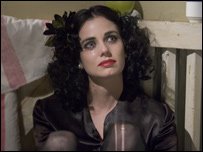Blind Picks from Netflix: After Hours (1985)
 After Hours is a very rare thing: a comedy that is thoughtful, significant and meticulously crafted. Scorcese is known for his serious films about New York City: Mean Streets, Gangs of New York, Taxi Driver, etc.. After Hours, his comic odyssey about the city that never sleeps, is just as effective and just as well made as any of his dramas. Griffin Dunne plays Paul, a lonely computer expert who hates his job and longs for a fuller personal life. One night, eating out alone, he strikes up a conversation with Marcy (Patricia Arquette) about Henry Miller. She asks him to come home with her and, in a fit of what we assume is extremely uncharacteristic spontaneity, he agrees. What begins as a romantic adventure into the wilderness turns into a journey though Hades as Paul loses his money, his keys and his dignity in an attempt to get home.
After Hours is a very rare thing: a comedy that is thoughtful, significant and meticulously crafted. Scorcese is known for his serious films about New York City: Mean Streets, Gangs of New York, Taxi Driver, etc.. After Hours, his comic odyssey about the city that never sleeps, is just as effective and just as well made as any of his dramas. Griffin Dunne plays Paul, a lonely computer expert who hates his job and longs for a fuller personal life. One night, eating out alone, he strikes up a conversation with Marcy (Patricia Arquette) about Henry Miller. She asks him to come home with her and, in a fit of what we assume is extremely uncharacteristic spontaneity, he agrees. What begins as a romantic adventure into the wilderness turns into a journey though Hades as Paul loses his money, his keys and his dignity in an attempt to get home.This movie is genius for the camera work alone. Dunne is sympathetic, funny and lovable as Paul. Linda Fiorentino, John Heard, Terri Garr, Catherine O'Hara, Cheech Marin and Tommy Chong all play characters that are totally believable as the people you run into late at night in New York City. Scorcese said that the inspiration for this film came from a move from downtown to TriBeCa that he almost immediately regretted and the sense of entrapment that ensued. The script was originally going to be done by Tim Burton, but Scorcese needed money to back The Last Temptation of Christ, so he took the project. I'm glad he did, because no one else could have made this film.


